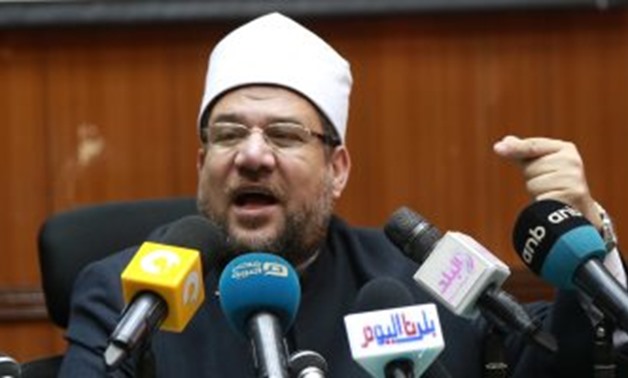
FILE – Minister of Endowments Mohamed Mokhtar Gomaa
CAIRO – 20 December 2017: Minister of Endowments Mokhtar Gomaa reviewed the ministry’s efforts in the Human rights issue during the Human Rights Committee meeting in Parliament.
Gomaa underlined under the dome of Parliament the recommendations of the Cabinet in applying human rights standards in Egyptian governorates.
Egypt Today presents the most prominent statements of the Endowments Minister.
1 - The political leadership, headed by President Abdul Fatah al-Sisi, has a vision for the field of human rights.
2 - Our state recognizes human rights that support loyalty to the nation, justice and equality among people.
3 - There are outsiders in any profession, including fatwa and the field of human rights; some organizations distort human rights. On June 30, we will have 3,000 new imams to renew the religious discourse. This is because it is important to make sure that preachers do not manipulate people. “If one has to choose between praying in the Friday Congregate behind a preacher who manipulates the worshipers’ minds and praying Friday alone as noon prayer, it would be better if one chose the latter,” Gomaa stated.
4 - The Ministry of Endowment has prepared more than one speech to promote human rights.
5 - We should not discuss the issue of fatwa lists before the ratification of the Parliament on the draft law of Fatwa.
6 - The Human Rights Committee in Parliament succeeded in serving national issues and played a role in supporting the state in clarifying human rights in Egypt at the international level.
7 - There are international human rights organizations used in destroying and attacking states, and this requires a strong Human Rights Committee in the Egyptian parliament.
8 - The universal health insurance bill is an inherent human right; any governance system that provides justice, eliminates corruption and enables citizens to enjoy the freedom of belief respects and fulfills the principles of human rights.
9 - Fulfilling administrative justice among all employees of the state is a human right. Our respect for human rights is proven through the government’s achievement of this justice.
10 - Solving people’s problems reduces their capacity for intensity and violence, leading to a stable society.
11 - The care of martyrs’ families is a human right. If fighters are sure that their families will be taken care of in case of their death, they would be significantly more courageous in protecting their homeland.
12 - Islam has not established a stable system of governance, our goal is good governance based on human rights norms.
13 - There is no Quranic text determining a certain age for marriage; therefore, it is subject to diligence and the final ruling is through legislation and law.
14 - There were mosques that were strongholds of groups, such as Hazem Abu Ismail and others, and citizens were afraid to pray in them, but the Ministry of Awqaf succeeded in controlling them after fighting large, and important, battles.
15 - The Ministry of Endowments is currently supervising the retraining and rehabilitation of all Awqaf cadres through the launch of the scholar "Alem" project.
16 - About 120 imams were given a training course of 800 hours over a year, including curricula in human development, national security and other educational matters.
Comments
Leave a Comment